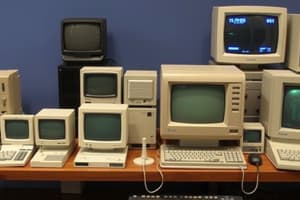Podcast
Questions and Answers
What was the name of the first programmable machine that marked the beginning of the first generation of computers?
What was the name of the first programmable machine that marked the beginning of the first generation of computers?
ENIAC (Electronic Numerical Integrator and Computer)
What type of technology did the second generation of computers introduce that significantly improved speed and reliability?
What type of technology did the second generation of computers introduce that significantly improved speed and reliability?
Transistors
What were some of the limitations of the first generation of computers due to their use of vacuum tubes?
What were some of the limitations of the first generation of computers due to their use of vacuum tubes?
Slow, inefficient, prone to failure due to heat generated by vacuum tubes
Which computer, considered the first commercially successful computer, belonged to the second generation of computers?
Which computer, considered the first commercially successful computer, belonged to the second generation of computers?
What significant technological change characterized the fourth generation of computers?
What significant technological change characterized the fourth generation of computers?
What major advancement marked the beginning of the third generation of computers?
What major advancement marked the beginning of the third generation of computers?
Which famous computer series is an example of a third generation machine?
Which famous computer series is an example of a third generation machine?
What key development characterizes the fourth generation of computers?
What key development characterizes the fourth generation of computers?
What is expected to characterize the fifth generation of computers?
What is expected to characterize the fifth generation of computers?
How has the advent of the PC revolutionized computing?
How has the advent of the PC revolutionized computing?
Study Notes
Computer Generations: A Historical Perspective
In the realm of computing, the term "generation" refers to a period characterized by significant technological changes and advancements. Throughout the history of computers, various generations have emerged, each with distinct features and capabilities. Let's delve into each of these generations to better understand the evolution of computing.
First Generation Computers (1940-1956)
Computing began with the invention of the first programmable machine, ENIAC (Electronic Numerical Integrator and Computer), which was built by the United States Army in 1946. The first generation of computers were large, room-sized machines that employed vacuum tubes. These machines were slow, inefficient, and prone to failure due to the heat generated by the vacuum tubes, causing them to burn out. Despite these limitations, the first generation of computers proved to be revolutionary in the field of computing.
Second Generation Computers (1956-1963)
The second generation of computers emerged with the development of solid-state electronics, namely transistors, which replaced the vacuum tubes. Transistors significantly improved the speed and reliability of computers, resulting in smaller, more energy-efficient machines. The second generation of computers included the IBM 1401, which was the first commercially successful computer in the world.
Third Generation Computers (1964-1971)
Introducing the integrated circuit, or IC, marked the beginning of the third generation of computers. ICs allowed for the creation of small-scale integrated (SSI) and medium-scale integrated (MSI) circuits, which resulted in even smaller, less expensive, and more reliable computers. The IBM System/360 series, created in 1964, is a famous example of a third generation machine.
Fourth Generation Computers (1971-Present)
The fourth generation of computers is characterized by the development of microprocessors and the personal computer (PC). Microprocessors, such as Intel's 4004, made it possible to build small, low-cost, and highly capable computers. The advent of the PC revolutionized computing, allowing individuals to own and operate their own computers. The development of operating systems, such as MS-DOS and Windows, further simplified the use of personal computers.
Fifth Generation Computers (Future)
While there is no widely accepted definition of the fifth generation of computers, it is generally understood to refer to the next major phase in computing. This generation is expected to be characterized by quantum computers, artificial intelligence, and the Internet of Things (IoT). Quantum computers, for instance, would exploit the principles of quantum mechanics to perform calculations far faster than classical computers. The fifth generation of computers is also likely to be more deeply integrated with the IoT, allowing for the creation of more intelligent and connected devices.
Despite the excitement surrounding the fifth generation of computers, it is essential to remember that technological innovation does not occur in a vacuum. The evolution of computer generations is shaped by a multitude of factors, from economic and social trends to scientific and technological advancements. As we continue to progress through the generations, we can expect to witness further developments that will shape the technological landscape for generations to come.
Studying That Suits You
Use AI to generate personalized quizzes and flashcards to suit your learning preferences.
Description
Test your knowledge about the historical evolution of computers through various generations, from the large room-sized machines of the first generation to the small, highly capable personal computers of the fourth generation. Explore the impact of key technological advancements on the progression of computing.




